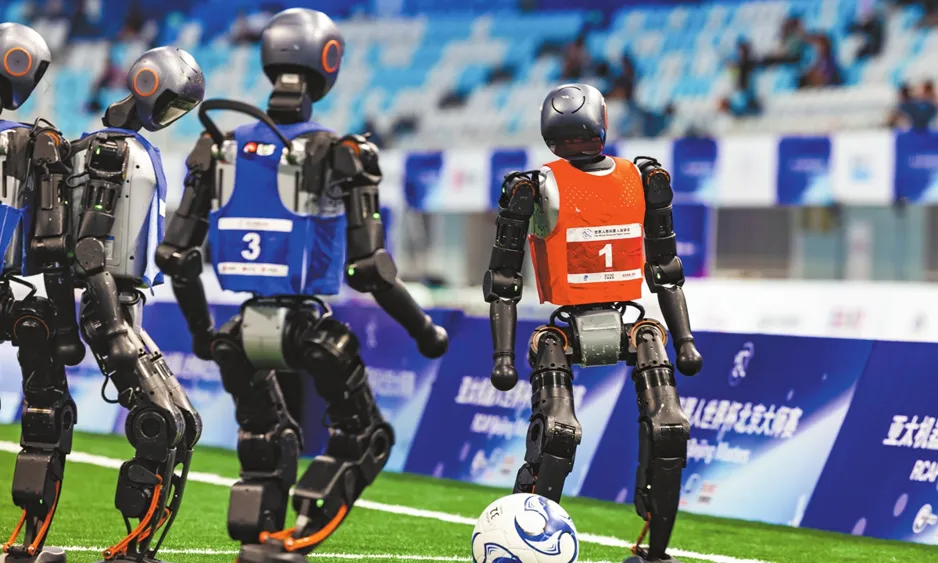Chinese Robotics Firms Boost Production Amid Commercialization Surge

Chinese robotics firms are experiencing a notable surge in production as the demand for humanoid robots escalates. A significant indication of this trend is Guangdong Tiantai's groundbreaking order for 10,000 humanoid robots, which illustrates the growing appetite for advanced robotic technologies.
Key players in China's humanoid robot sector are responding to this burgeoning demand by ramping up order volumes, ultimately driving the industry toward a more developed ecosystem aimed at large-scale commercialization.
AgiBot, also known as Zhiyuan Robotics, recently held its first partner conference in Shanghai, unveiling ambitious goals to significantly increase its production capacity. The company expects to ship thousands of units this year, with plans for tens of thousands in the subsequent year, reflecting a robust growth strategy.
As reported by Yao Maoqing, a partner at AgiBot and president of the company's embodied intelligence division, the firm aims to deliver between 3,000 and 5,000 robots this year, marking a substantial increase from the 1,000 units shipped earlier in January.
According to Peng Zhihui, AgiBot's co-founder, the company has set its sights on launching hundreds of thousands of general-purpose robots within the next three years. These robots are designed to autonomously generalize across multiple tasks, thereby fostering an open and self-sustaining innovation ecosystem within the field of general-purpose robotics.
The push for increased production at AgiBot underscores the growing enthusiasm among Chinese robotics startups, particularly as domestic demand for these advanced technologies sees remarkable growth.
In another groundbreaking move, Guangdong Tiantai Robot Co has signed a monumental agreement for the world’s first order of 10,000 embodied intelligent humanoid robots, in collaboration with several partners in China. The company is committed to delivering these humanoid robots targeted primarily at family healthcare applications by the end of 2026.
This partnership sets a new benchmark for the scale of humanoid robots in China and paves the way for their integration into everyday life as well as various sectors, according to industry insiders.
These developments signify a pivotal shift in China's humanoid robotics industry, transitioning from mere demonstrations to practical applications. Industry experts note that major firms are now securing substantial contracts and launching new products to satisfy a rapidly growing market demand.
Recent statistics indicate that China’s robotics sector has witnessed exponential growth. In the first half of the current year, production of industrial and service robots surged by 35.6 percent and 25.5 percent year-on-year, respectively, highlighting the industry's robust expansion.
Alongside advancements in robotics, China is making substantial progress in its artificial intelligence (AI) sector. The Ministry of Industry and Information Technology recently released a document to encourage the integration of AI in small and medium-sized enterprises, aiming to bolster innovation and create new business opportunities.
These efforts reflect the Chinese government's dedication to fostering a dynamic ecosystem for AI innovation while addressing challenges related to application and industrialization. Regional innovation centers are being established to promote technological advancement, further solidifying China's position in the global robotics and AI landscape.
Read These Next

Product Focus Drives Strategic Growth
The article discusses significant strategic changes in a company's product orientation and income growth strategy, particularly focusing on the product line "大魔王"麻酱味素毛肚. It highlights impressive revenue growth, effective channel performance, risks related to raw material costs, and the challenges of e-commerce channel effectiveness and traditional market slowdowns.

Trump's Nvidia and Intel Interference Criticized by Isaacson
Walter Isaacson critiques Trump's interference in corporate affairs of Nvidia and Intel, arguing it's a form of crony capitalism that undermines competitive markets and innovation.

EU and US Reveal Trade Deal Details Excluding Wines and Digital Rules
EU and US trade deal promises market access but excludes wine and digital sectors, raising concerns over international trade tensions.
